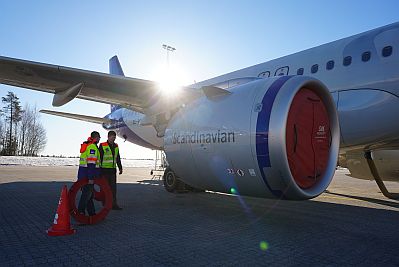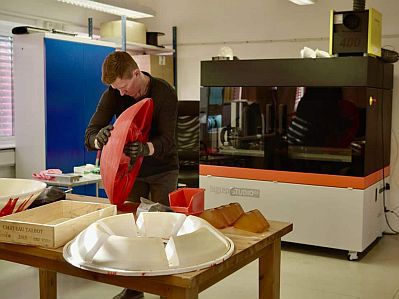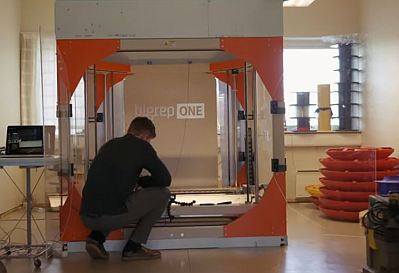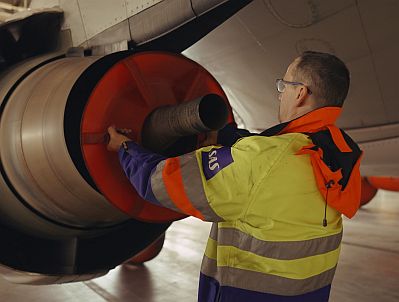Need to Store an Airplane Safely? 3D Printers to the Rescue
The COVID-19 pandemic halted most travel, resulting in the immediate grounding of 62% of passenger planes. Grounding a fleet is not an easy task and requires the plane engines to have protection from the elements to avoid major issues afterward. CNE Engineering relied on BigRep machines to 3D print the engine covers needed for Scandinavian Airlines (SAS) to safely store their grounded planes.
When the COVID-19 pandemic halted most travel, airplane engines needed protection from the elements when parked for long periods, and standard procedures require covers to prevent damage from moisture and other objects.
But with the sudden grounding of many planes, Scandinavian Airlines (SAS) did not have the necessary inventory of off-the-shelf engine covers, exhaust plugs, etc. The domino effect of supply chain shortages worldwide meant that it was impossible for SAS to simply order more equipment to protect their fleet.

Initially, as a remedial fix to safely storing grounded planes, SAS used plastic wrap and tape, an acceptable approach for short-term storage. However, as the pandemic extended, a longer-term solution that was quicker and more cost-effective was needed.
SAS determined that shortening the supply chain was the key -- harnessing more locally available resources.
They considered 3D printing solutions but needed technology large enough to produce engine exhaust covers. SAS turned to CNE Engineering, a local (Oslo, Norway) specialized supplier using BigRep 3D printers, to find a solution.
The engine exhaust covers would need to withstand high temperatures, exhibit chemical and UV resistance, and be soft enough to not damage the engine upon removal and installation. Based on these requirements, castable urethane, a widely available and low-cost material, would be the best option.

Nathan Brown, CNE Engineering Founder, sees endless opportunities for large-scale 3D printing. He hopes to expand designing and 3D printing tooling and equipment for other airlines with their ground-service needs as well as other industries.
CNE's Nathan Brown, Managing Director of CNE said, "There was an opportunity to not only fill their need for this tool they couldn't acquire through the normal supply chain, but we also saw the opportunity to make it better."
CNE planned to use its two BigRep machines to 3D print molds to produce several cast parts.
The BigRep ONE's cubic meter build volume could accommodate the primary, large-scale piece. BigRep's STUDIO was a perfect choice to print the smaller features, like removable mold inserts.

By utilizing their BigRep large-format 3D printers CNE Engineering was able to act quickly, and produce custom tooling and equipment in-house at full scale to meet the immediate needs of SAS during the COVID Pandemic.
CNE used various BigRep materials for different parts: bio-based PLX for the outer shells, HI-TEMP CF for the center core, and TPU for the insert molds. Thanks to large-format 3D printing, CNE was able to meet SAS's timing requirements as tooling was printed in a few days, and castings required only hours.
Jason Deadman, Production Engineer at SAS says, "There is so much that goes into aircraft maintenance that you don't see. Technology is something SAS is embracing."
Within two months of the kick-off meeting, SAS received its initial order. CNE's success with their BigRep machines shows the full range of what 3D printing offers: fast production, design flexibility, low volume, low cost, and minimal waste.

he new 3D printed engine covers save about 8 hours of work that was necessary to wrap the engine with plastic.
BigRep's Chairman of the Board and Managing Director of 360 Aircraft Finance Peter Smeets said, "This case study is a shining example of how BigRep's large-format 3D printers are already changing the game in aerospace MRO. We believe this is only the beginning and that 3D printed solutions will become the gold standard for custom, cost-effective manufacturing free from traditional supply chain issues."
Want more information? Click below.
Rate this article
View our terms of use and privacy policy ::m::